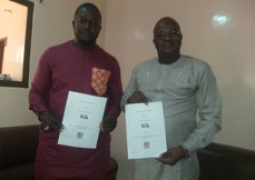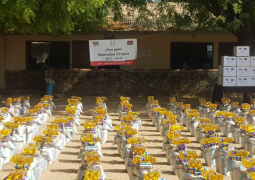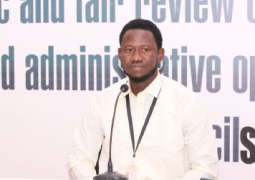During the event, the Director of Fisheries, Anna Mbenga Cham said the Ministry is determined to ensure that the nation’s living marine resources are utilised sustainably to generate employment opportunities, provide income and contribute to poverty alleviation, and improve food and nutritional security of the population.
Director Mbenga pointed out that, with support from the partners, the government of The Gambia is providing fisheries infrastructure facilities, fishing-related equipment and machinery, and means for fish distribution and marketing within the country.
In celebrating World Fisheries Day, Director Mbenga stated that their development partners pilot projects on fish handling and processing facilities, including improved fish smoking through the construction of FAO- Thiaroye Technology; sanitary and water supply systems are provided in major fish landing sites.
Ms. Moshibudi Rampedi, FAO Country Representative said the celebration of world fisheries day 2022 collided with the international year of artisanal fisheries and aquaculture.
She stated that FAO statistics on Fisheries and Aquaculture confirm their importance to food security and nutrition.
‘This celebration happens once every year and it is an opportunity for FAO and partners to discuss how social protection, with integrated fisheries policies, can support equitable development of the sector,’ Ms. Moshibudi Rampedi said.
She reminded partners that, in the FAO code of conduct for responsible fisheries, there should be minimising overfishing and illegal, unregulated, and unreported fishing.
“The code further stated that it should encourage the introduction of appropriate legal and policy instruments, cooperate and promote better management and protect aquatic resources and invest in aquaculture. ‘Effective fisheries management can rebuild stocks and increase catches within ecosystems.” FAO country rep stated.
Fanta Bojang, Deputy Permanent Secretary, Ministry of Fisheries said fishing is an economic activity that provides food and livelihoods to thousands of Gambians directly and indirectly as one in every seven Gambians works in the fisheries sector.
Accordingly, she said the government has identified the fisheries sector as one of the key sectors that contributed immensely to the economic diversification of the country.
As part of the commemoration, DPS Bojang said the fisheries sector faces a myriad of threats from the degradation of the food web by irresponsible human activities and climate change, the degradation of habitats that are related to pollution, destruction, and overexploitation which is linked to legal overfishing and illegal fishing.
She concluded that these myriads affect 50 percent of fish stocks in western Africa and greatly diminished the fish stocks in the Gambia.
Present at the commemoration was Amie Ceesay-Jaiteh, president of the Federation of Gambia Women in Fisheries.





